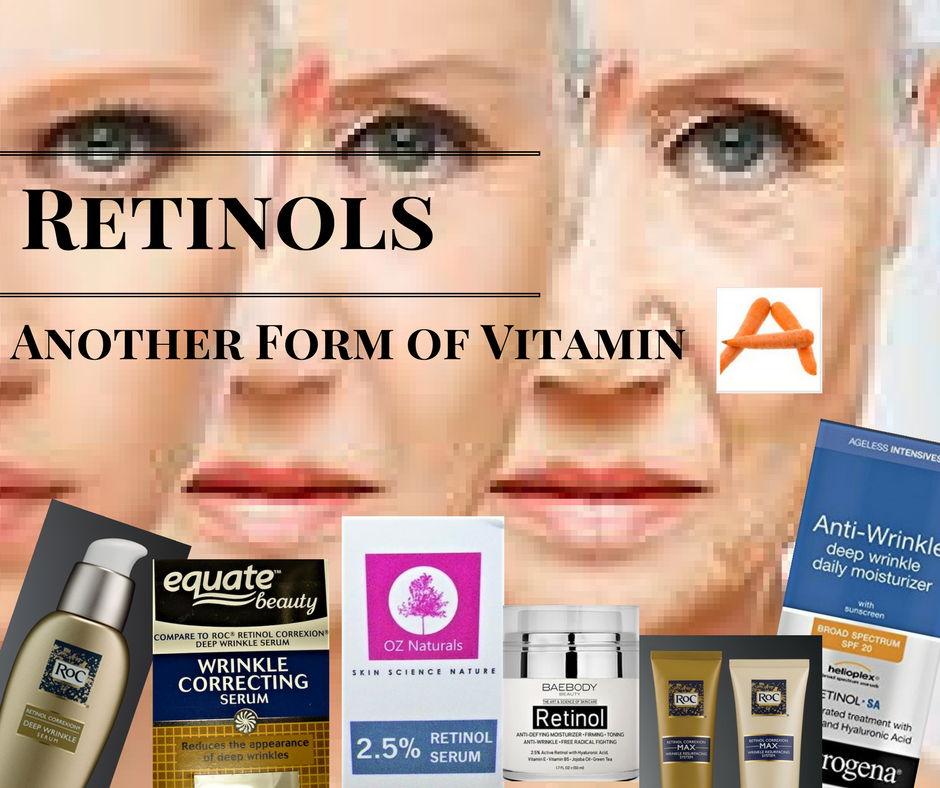The main thing to do when choosing a product with vitamin A as an ingredient is to read the label - all of the label, the ingredients, what it promises to do, who tested it, anything and everything on the label. There are certain ingredients you should consider eliminating right off the top. Certain ingredients may be weaker, have serious side effects, or may be dangerous to your health.
(As with everything, you are the only judge as to what you use. I am not an expert, I only know what I would choose or myself and I am willing to share with you the information I have gathered on the matter. You must make your own decision on whether to use these products or not.)
Here are the major forms of vitamin A and a little information on each:
1. Retinol
2. Differin
3. Retin A
4. Tretinoid
5. Retinoid
Each does well for what they do, but none of them are perfect. Some you can purchase over the counter in the beauty department of your local store. A few require a prescription from your doctor. Cost vary and so does effectiveness.
Dana Sachs, an associate professor of dermatology, at the University of Michigan Medical School says:
"In off-the-shelf formulas,
the ingredient called retinol
is the only derivative of vitamin A worth using."
A few facts about Retinol from www.allure.com:
1. Non-prescription alternatives of vitamin A needs to be converted into retinoic acid by the skin at the cellular level.
2. Daylight breaks Retinol down, so it is recommended that you use with a sunscreen or void sunlight after treatment.
3. It is also recommended to apply to dry skin.
4. May take as long as 12 weeks to work, with continued improvement for up to a year and in some cases longer.
5. While these forms do workn to a certain degree, they are weaker than other forms: Pro-retinols, Retinyl Palmitate, Retinyl Aetate, and Retinyl Linoleate. (Check the ingredient list for these)
6. Retinol is a form of Vitamin A — it's the kind people get when they consume animal products like eggs or milk.
According to http://www.health.com/beauty/best-retinol-cream these are the best over-the-counter Retinol creams by dermatologists:
1. Neutrogena Ageless Intensive Deep Wrinkle Moisture Night Cream - $22 Walgreens
2. CosMedix Serum 16 - $80 www.dermstore.com
3. Neocutis Nouvelle Plus Retinol Correction Intensive Anti-aging Cream - $150 www.dermstore.com
4. ROC Retinol Correction Deep Wrinkle Night Cream (highest strength retinol you can get before a trip to the dematologist office) - $20 Target (Best)
5. Amarte Wonder Cream - $120 www.dermstore.com
6. Hydro Peptide Anti-Wrinkle Polish & Plump Peel - $78 www.dermstore.com
7. Neutrogena Rapid Wrinkle Repair Moisturizer SPF 30 - $18 Target
8. Skin Medica Retinol Complex .25 - $62 www.dermstore.com (mildest)
What are some of the side effects of retinol? According to http://www.wisegeek.org/what-are-retinol-side-effects.htm the following are known side effects. I recommend you visit their website for the details.
1. Peeling skin is one of the most common retinol side effects.
2. Dryness, redness and itching
3. In some cases, the higher cell turnover rate retinol causes can result in breakouts.
4. Sun sensitivity, retinol increases a person's sensitivity to ultraviolet radiation, so it often is easier to get a sunburn after using it.
5. Drug interactions, a wide range of drugs interact with retinol, including anticoagulants, tetracycline antibiotics, hepototoxic or liver damaging agents, orlistat and oral medications.
6. General toxicity symptoms, it is not common for a person's retinol levels to reach toxic amounts, but it is possible, and certain drugs, such as those used to control cholesterol, can make overdose more likely.
7. Birth defects, even though a fetus needs vitamin A to develop and be healthy, medical professionals think that retinol might cause birth defects when used in amounts exceeding the recommended daily allowance (RDA).
Retinol and Retin A is considered the fountain of youth aside from surgical procedures such as mini-face lifts, brow lifts, lip implants, or full face lifts. While it does improve the skin, it also comes with a few side effects that may not be desirable.
In my next blog post on Vitamin A I will look at Retin A.
Do you use an over-the-counter Retinol product? Have you had good results using an over-the-counter Retinol product? Have you experienced any side effects, good or bad?
XOXO

 RSS Feed
RSS Feed